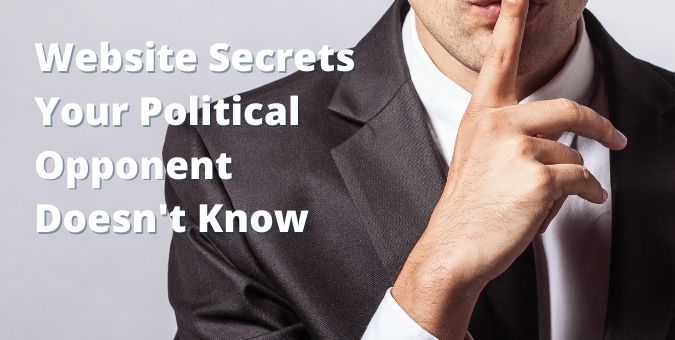For many first-time candidates, the online campaigning can be an intimidating experience. Technology trends from larger campaigns have trickled down to local races. It’s true that there is a lot more to know today. The bar has been raised as to what the public expects from political candidates online.
If all of this is new to you, relax! You are not alone. Most candidates running for local office do not have a lot of online campaigning experience. We’ve seen candidates with zero experience run defeat a political opponent with a smart online strategy.
On the first campaign we ever worked on, the political opponent was an entrenched incumbent. We were able to promote our candidate’s website and positive news coverage online, while also promoting the negative coverage of our opponent. We were able to attack with impunity, as the opponent had no online presence to start.
Before you worry about creating your campaign website, building out your email list, and what Facebook pages you will create, keep these items in mind:
 Websites don’t win elections: Good candidates and effective campaigns win elections. Campaign websites and social media are ways to communicate with voters, not an end in themselves. Online support only matters if you can translate it into votes. If all your campaigning consists of sending Tweets and posting Facebook updates, then you are going to be in trouble. The web has added to the rules of traditional political campaigning – it hasn’t replaced them.
Websites don’t win elections: Good candidates and effective campaigns win elections. Campaign websites and social media are ways to communicate with voters, not an end in themselves. Online support only matters if you can translate it into votes. If all your campaigning consists of sending Tweets and posting Facebook updates, then you are going to be in trouble. The web has added to the rules of traditional political campaigning – it hasn’t replaced them.- Nobody will find your site automatically: Just putting up a website and expecting visitors automatically is a recipe for failure. Getting people to find your site when they search for you can take a little work. Promote your website in print materials and signage, but also online and through links from other websites. Putting in place a strong SEO strategy will help grow your site traffic.
- Content matters: The only thing more important than having a campaign website is the content within it. Tell voters who you are, where you stand on the issues, how they can volunteer and donate, and how they can help spread the word about your campaign. Use your website as the hub of your online campaign.
- You don’t have to spend a fortune to be online: The cost of a Facebook page and Twitter account is nothing. Building a campaign website can vary in cost, but it’s always sad to hear how a small campaign spent two, three, or even five thousand dollars or more just to get a small site up and running. (Our prices are a lot less, by the way.) Political campaigns are dynamic, and website updates are frequent. If you have to pay an outsider every time you want to make a change to your site, that’s money lost that could go toward other things, like campaign signs, mailings, or fundraising outreach.
- You WILL need to spend money to promote your campaign online: Well, maybe not a fortune. But if you want exposure online, you will need to pay for it. Your online advertising options can include Facebook advertising, pay-per-click ads, and IP targeting. You will want to budget for these advertising expenses as you would for offline advertising.
- Following the rules is a must: Be sure to follow any required website and donation disclaimers, along with other rules, such as what you can and cannot include in your website design. At the very least, breaking rules can become a distraction if your opponent makes a big deal out of a small infraction. In a worst-case scenario, breaking a finance or election rule can get you knocked off the ballot.
Keep an eye on your political opponent
There are a few things that you can do before looking into tracking your political opponents. One important thing is to conduct an analysis using some basic information, such as their name, website URL, social handles, contact details, etc.
Keep an eye on your opponent’s website, social media accounts, press releases and even online donor information. Subscribe to their email list, if they have one. (Do this through a throwaway email account, of course.) Set up tracking through Google Alerts to be notified about online mentions and updates. Track them relentlessly. There are many benefits to just paying attention:
- You will know what the opposing side is saying about you.
- You can get a heads-up on your opponent’s next moves.
- You can find out who is donating.
- You may find an opportunity to attack.
You can be sure the opposition will be doing the same to you.
We wish we could tell you that this is all you need to know to run an effective online campaign, but it isn’t. New candidates should take the time to learn about all the options available in political web design and the digital landscape. Knowing your options will help you prepare a successful digital strategy.
Online Candidate was created to make building your political campaign website as quick and pain-free as possible. We also offer political marketing Services to help set up your online presence.
Political IP Targeting Strategies for Your Campaign »
Tags: local campaigns








